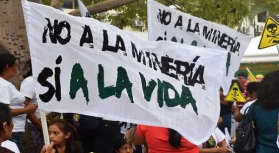Special Report: Salvadoran Feminists Push Debate on El Salvador’s Stringent Abortion Ban
Salvadoran feminist and women’s organizations are waging an international campaign demanding a pardon for the 17 women currently incarcerated in El Salvador for abortion, in hopes of challenging the country’s harsh anti-abortion laws and beginning to change the anti-choice views held by the vast majority of Salvadoran society.
Each of the 17 women in question was arrested while seeking hospital care for pregnancy complications when medical staff notified the police on suspicion that the women had intentionally interrupted their pregnancies. All women were impoverished, with low education levels; none received proper forensic examinations, nor were they subject to due process before being sentenced to between 12-40 years in prison. Feminist groups argue that the 17 women’s treatment violates myriad international treaties ratified by El Salvador, a country with some of the most stringent abortion laws in the Western Hemisphere, where interrupting a pregnancy is illegal with absolutely no exceptions. Multiple UN agencies have condemned and recommend changes to the laws, which disproportionately affect impoverished and working class women, while wealthy women can seek reproductive care freely abroad or in private hospitals and clinics.
All three branches of government are required to approve a pardon, a particular challenge in a country where the ultra-conservative political Right and the extreme Opus Dei sect of the Catholic Church still exercise enormous power. On April 1st, pro-choice groups presented a petition for pardon to the Human Rights Commission of the National Legislative Assembly. As Salvadoran law requires, the Commission notified the Supreme Court on July 10, which now has until August 9 to issue a decision as to whether or not the Assembly can proceed; the petition then requires a simple majority vote in the Assembly before it can finally pass to the Executive branch, where the President must either approve or veto the request for pardon.
The previous and present leftist Farabundo Martí National Liberation Front (FMLN) administrations have made extraordinary strides in promoting and protecting women’s rights and participation. Still, the legislature’s Human Rights Commission is presided over by a legislator from the right-wing Nationalist Republican Alliance (ARENA) party, and just last year, the conservative Supreme Court denied a young woman, given the pseudonym “Beatriz,” a life-saving therapeutic abortion after the Director of the National Forensics Institute, a member of Opus Dei, recommended against the procedure. The Funes administration was the first to take on the controversial topic of modest loosening of abortion prohibitions; former Minister of Health Dr. Isabel Rodriguez advocated for a therapeutic abortion for Beatriz and, after it was denied, approved a pre-term cesarean at the last minute, saving the young woman’s life. In addition, Julia Evelyn Martinez, former director of the Salvadoran Institute for Women’s Development (ISDEMU), signed an international commitment to review the country’s abortion laws. An ensuing media controversy, however, resulted in Martinez being forced to step down from her position, revealing the weight of the staunch opposition to abortion in the majority public opinion.
Unsurprisingly, El Salvador’s right-wing parties have vehemently opposed pardons for the 17 women. As in the past, the FMLN has not taken a public position on the issue, likely out of fear of alienating socially conservative supporters, though some party leaders have expressed public support for the women.
Strong organizing from the women’s movement has pushed the debate forward over the last year, rallying significant international attention. Nevertheless, the topic remains taboo in much of Salvadoran society, and the organized women’s movement has a long struggle ahead to shift public opinion and forge openings toward reproductive justice in El Salvador.

 "I am a CISPES supporter because continuing to fight for social justice and a more people-centered country means continuing the dream and sacrifice of thousands of my fellow Salvadorans who died for that vision.” - Padre Carlos, New York City
"I am a CISPES supporter because continuing to fight for social justice and a more people-centered country means continuing the dream and sacrifice of thousands of my fellow Salvadorans who died for that vision.” - Padre Carlos, New York City

